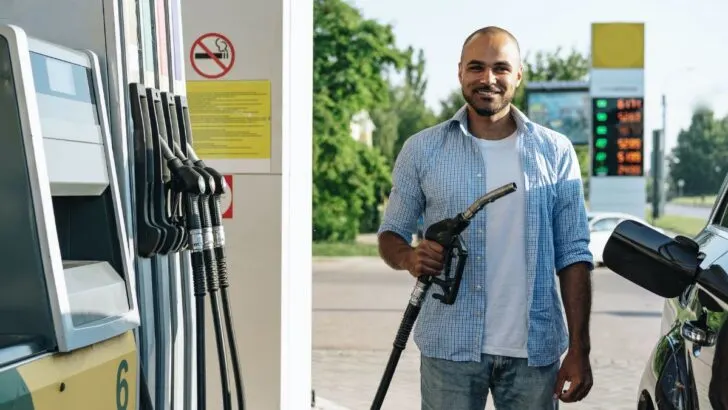Many drivers wonder if premium gas is better than regular gas. Premium gas has a higher octane rating than regular gas, but it also comes with a higher price tag. The answer to whether or not premium gas is better depends on the car in question.
Premium gas may be better for some vehicles, as it typically has a higher octane rating than regular gasoline, which can provide better performance in high-performance engines. However, for most vehicles, using regular gasoline is sufficient, and using premium gasoline is not necessary, and can even be a waste of money.
In this article, we will explore the differences between premium and regular gas, and when it is necessary to use premium gas for optimal performance.
Table of Contents
What is Premium Gas?
Premium gasoline is a type of fuel that has a higher octane rating than regular gasoline.
The octane rating is a measure of a fuel’s ability to resist “knocking” or detonation, which is an uncontrolled explosion in the engine’s cylinders. Higher octane fuel can withstand more compression before detonation occurs, which is why it is often used in high-performance engines.
Most gas stations offer three types of gasoline: regular, mid-grade, and premium.
- Regular gasoline typically has an octane rating of 87
- Mid-grade ordinarily has an octane rating of 89.
- Premium gasoline usually has an octane rating of 91 or higher.
The specific octane rating of premium gasoline can vary depending on the brand and location of the gas station.
Using premium gasoline in a car that does not require it is not necessary and will not provide any benefits. In fact, it can be a waste of money since premium gasoline is typically more expensive than regular gasoline!
However, if a car manufacturer recommends or requires the use of premium gasoline, then it is important to follow that advice to ensure optimal performance and avoid potential engine damage.

Is Premium Gas Better for Your Car?
When it comes to gasoline, there are typically three different grades available at the pump: regular, mid-grade, and premium.
Premium gasoline is typically the most expensive option, but is it actually better for your car?
Let’s take a closer look!
Benefits of Using Premium Gas
One of the main benefits of using premium gasoline is that it typically has a higher octane rating than regular gasoline.
This means that it can help prevent engine knocking and improve overall engine performance in certain types of vehicles.
In fact, some car manufacturers even recommend using premium gasoline for their high-performance models.
Another benefit of using premium gasoline is that it can help keep your engine cleaner over time.
Premium gasoline typically contains more detergents than regular gasoline, which can help prevent the buildup of deposits in your engine and fuel system. This can lead to improved fuel efficiency and lower emissions over time.
Drawbacks of Using Premium Gas
While there are some benefits to using premium gasoline, there are also some potential drawbacks to consider.
One of the biggest drawbacks is the cost.
Premium gasoline is typically more expensive than regular gasoline, and the cost can add up over time. If your car doesn’t require premium gasoline, you may be better off sticking with regular gasoline to save money.
Another potential drawback of using premium gasoline is that it may not provide any noticeable benefits for certain types of vehicles.
If your car doesn’t require premium gasoline and isn’t a high-performance model, you may not notice any significant difference in engine performance or fuel efficiency by using premium gasoline.
Ultimately, whether or not premium gasoline is better for your car depends on a variety of factors. If your car manufacturer recommends using premium gasoline, it’s generally a good idea to follow their advice.
However, if your car doesn’t require premium gasoline, you may be better off sticking with regular gasoline to save money.

When Should You Use Premium Gas?
Using premium gas is recommended for high-performance vehicles that have high-compression engines, turbochargers, and other high-performance aspects.
Cars that require premium gasoline have engines that are designed to operate at higher temperatures and pressures, and using regular gas in these cars can cause engine knock, reduced fuel efficiency, and increased emissions.
Keep in mind that not all cars require premium gas.
If a car manufacturer recommends premium fuel, it’s best to follow that advice. However, if a car’s owner’s manual specifies that regular gas is acceptable, using premium gas won’t provide any significant benefits.
In fact, using premium gas in a car that doesn’t require it can be a waste of money, as it can cost as much as 50 cents more per gallon than regular gas.
It’s also important to note that using premium gas in a car that’s designed for regular gas won’t improve its performance or fuel efficiency.
One of the reasons people buy premium gas is that they think it will improve the performance of their car or give them better gas mileage. However, unless the car is designed to use premium gas, using it won’t provide any benefits.
Overall, if a car manufacturer recommends premium gas or if the car has a high-performance engine that requires it, using premium gas is recommended.
However, if the car’s owner’s manual specifies that regular gas is acceptable, using premium gas won’t provide any significant benefits and can be a waste of money.
What Happens When You Use Regular Gas in a Car That Requires Premium?
Using regular gas in a car that requires premium can have a negative impact on the engine’s performance. Premium gas has a higher octane rating, which means it can withstand higher compression before igniting.
Regular gas has a lower octane rating, which means it can ignite prematurely in high-compression engines, causing knock or ping.
If you mistakenly fill up with regular fuel, your car’s engine control unit (ECU) will adjust engine timing and performance to work with the lower-octane fuel. In most cases, this is okay for the times when there is no premium gas available, but it can lead to decreased performance and fuel efficiency over time.
According to Cars.com, using regular gas in an engine that requires premium could void your warranty. That is most likely to happen if using regular causes severe engine knock or pinging (premature ignition).
If you use regular gas in a car that requires premium and experience engine knock or pinging, you should switch back to premium gas immediately.
Truecar explains that if your car requires premium gas, don’t skimp out. While you might save money on gas, your car will be less powerful and fuel-efficient. This can make a huge difference in vehicles with available turbocharged engines.
What if your car requires premium gas and it isn’t available? According to Cars.com, it is better to put in a lower grade of gasoline than no gasoline at all.
Will Premium Gas Hurt My Car?
Many drivers wonder if using premium gas will hurt their car, especially if their car’s manufacturer recommends regular gas.
The answer is generally no.
Using premium gas in a car that only requires regular gas will not cause any harm to the engine or other components of the vehicle.
However, it is important to note that using premium gas in a car that requires it is essential to maintain the performance and longevity of the engine.
Premium gas has a higher octane rating, which means it can withstand higher compression without detonating. This is important for high-performance engines that require higher compression ratios to deliver maximum power.
Using regular gas in a car that requires premium gas can cause engine knock, which can damage the engine over time.
Engine knock occurs when the fuel mixture ignites prematurely, causing a knocking or pinging sound. This can lead to increased wear and tear on the engine, reduced fuel efficiency, and potentially costly repairs.
It is important to follow the manufacturer’s recommendations for fuel type to ensure the best performance and longevity of the vehicle.
While using premium gas in a car that only requires regular gas will not cause harm, it is not necessary and can be a waste of money.
Conclusion: Is Premium Gas Better
It’s clear that the decision to use premium gas ultimately depends on the specific vehicle and its manufacturer’s recommendations.
For vehicles that require premium gasoline, using regular gas could result in decreased performance and potentially cause engine damage. However, for most standard vehicles on the road, regular gas is sufficient, and using premium gas does not provide any significant benefits.
While premium gas may have a higher octane rating and be more expensive, it does not necessarily mean it is better for every vehicle. In fact, regular gas can perform just as well in most cases and is a more cost-effective option.
It is important to always refer to the vehicle’s owner’s manual to determine the recommended type of gasoline. Using the wrong type of gas can result in engine damage and costly repairs.
Overall, the decision to use premium gas should be based on the specific needs of the vehicle and its manufacturer’s recommendations. For most standard vehicles, regular gas is the best option and provides sufficient performance without the added cost of premium gas.
If you found this article helpful, then make sure to check out some of the related posts below!
